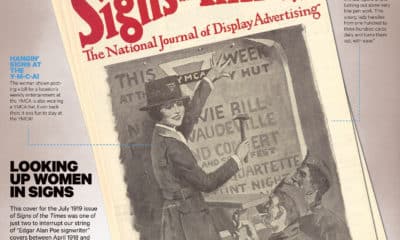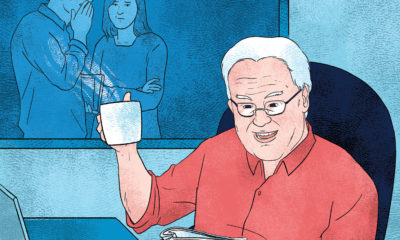
A Once Fired-Up Sign Designer May Be Burning Out at Work
A not uncommon situation in “The Case of the Extinguishing Fire.”
Published
3 months agoon
GUY MONTAGUE LOOKED out of the bricked arch of his office window, the building a converted firehouse from 1872, and wondered what had happened to the fired-up designer his employee Catherine Beatty used to be — and had been till just six months before. Now in her seventh year with Firehouse Signs in Harrisburg, PA, evidence of the fabled “seven-year itch” began to present itself.
Good sign designers come at a premium. Good ones who produce vast quantities quickly are treasured greater than gold, diamonds and the world’s biggest necklace. After being hired, Catherine responded well to training, rapidly got up to speed and eased into the workflow. She then strung together a half-dozen years operating at a level higher than Firehouse Signs’ other designers, not only earning but savoring the reputation as the “go-to” for five-alarm projects.
ABOUT REAL DEAL
Real Deal scenarios are inspired by true stories, but are changed to sharpen the dilemmas involved and should not be confused with real people or places. Responses are peer-sourced opinions and are NOT a substitute for professional legal advice. Please contact your attorney if you any questions about an employee or customer situation in your own business.
ABOUT THE AUTHOR
Created by ROLF L’MAO, Signs of the Times’ mascot. Email him at editor@signsofthetimes.com.
Illustrations by Karina Marga Cuizon
But two seasons prior, Catherine requested an unusual amount of PTO, nearly depleting her bank with much of the year remaining. Then, she started complaining about change requests. We all complain about them, especially when the changes are miniscule or for the worse, but Catherine complained more and louder. Guy suspected something might be going on in her personal life, but decided not to intrude even as he hoped Catherine might open up about whatever was bothering her.
Next came some passive-aggressive attitude about her “go-to” status. “I’m not the only designer here,” Catherine started saying to anyone sliding down the pole with another hot project. In truth, she was right, but she had once relished the role and soaked up the praise every time she doused a fire. Guy had to consider that the shop had possibly become too reliant on Catherine, asking and taking too much from her. He decided to ask what had been affecting her work, but when he did her response in so many words was, “Oh, nothing.”
Had Catherine reverted — or inverted — to “just another designer” at Firehouse Signs? Guy theorized she might be largely burnt out, that despite the energy and positivity of the previous years, the fire in her belly once hot enough to ignite the whole staff had consumed its fuel. That said, she was still doing the work, good work, and producing at a rate commensurate with the other designers. Guy felt at once disappointed he was no longer getting more from Catherine, but also full of doubt and some regret that the company may have inadvertently taken advantage of her for so long — ultimately altering her way of work and her personality.
“She might already be soft quitting,” Guy thought. The possibility of having to hire someone — in this market — was becoming more real by the day.
At that very moment, Catherine knocked on Guy’s door. “Got a minute?” she asked.
“Sure,” Guy said, turning away from the window. “What’s up?”
“What’s the company’s policy on unpaid time off?”
My thanks to Jeff Thomas, Cross-road Sign Studio (Lynnwood, WA) for this idea. — Rolf L’mao. If you have an idea to suggest, send it to editor@signsofthetimes.com.
AdvertisementThe Big Questions
- What would you do if you were Guy Montague? How would you handle the situation with Catherine Beatty? How hard would you try to retain Catherine as an employee?
Bobby J.
Joppa, MD
“What is going on? How can I help you?” Pause… My responses would be based on the personal situation. I would definitely help an employee in their personal life 100% if I could. You have got to get her to open up. If not, she is gone mentally and physically. There is no coming back from that. Inevitably, some designers need change and new challenges. A fresh start for a designer who puts out fires could reignite the flame.
Robert B.
Oakdale, CT
Something is definitely up with her and she obviously doesn’t want it known in the workplace. If you feel she is worth the time off, give it to her and hope she comes back ready to go again. It’s better to be short staffed for a while and get back a trained designer than try to find help these days.
Kevin B.
Fort Collins, CO
Guy needs to create a sabbatical policy in the next five minutes and be as honest and vulnerable with his own situation as possible. Hopefully, that honesty will flow both ways and a compromise can be figured out. If Catherine gets a sabbatical, she should be interviewed on her way out and on her way back. When she comes back she could be put on a growth track, given a coworker to mentor, or given part-time status, whatever works best as a compromise built out of communication to give her space and fulfilling work.
Anonymous in OR
The sign industry does not support designers and … has been slowly going downhill for years. If you are creative, don’t design for a sign company. The creative work happens within design firms and architectural firms. [Sign design] is more technical layout with just “an eye” for design. High volume with no errors is the goal and nothing else… If everyone is starting to use a good worker too much — stop and recalibrate. Give them a raise and a “voice” in company, help them set boundaries and back them up. It’s just what is happening with all work these days. SIGN COMPANIES NEED TO START THE STANDARD OF “DESIGN/BUILD” CONTRACTS. Free design leads to everyone not respecting the design process.
Rick P.
Downingtown, PA
Good employees are very difficult to find. And to find a good employee that fits in with your culture and staff makes it even harder. I would have a heart-to-heart talk with this employee to see if she is burned out or if it is an outside issue. If she is burned out, many times a change in roles or responsibility can help. You discuss her goals and where she wants to be in the next several years. Maybe she doesn’t feel there is any growth for her in the organization. Maybe her pay rate does not reflect what she feels her value is worth. It may be that she just needs more flexibility with her schedule to take care of issues outside of the company. If you don’t ask, you will never know and likely lose a great employee.
Marc H.
Edmonton, AB, Canada
Prior to providing details of the policy for unpaid time off, I would have Catherine take a seat, make her comfortable and get a solid understanding of the reasoning behind the question in an open and supportive environment. This would provide an opportunity to see if there are other options you, as an employer, can provide for Catherine that may be better suited for her situation or circumstance. Discuss these other potential options along with the unpaid time off policy with Catherine and see if there is anything that she would consider that could accommodate her situation. You may also provide her some time to mull over the information that you have provided to her before she makes a decision, and be open for future discussion or even suggestions. Depending on how empathetic you are, this will go a long way to show understanding, support and trust of the employee and that you value them. A word of caution, you want to avoid setting a precedent for future situations.
Dan W.
Tucson, AZ
Sure thing. How much time do you need? We’ll make it work.”
Anita M.
San Antonio
After asking for time off again, I think I would want to have a conversation with her. I would be concerned — maybe she’s dealing with health issues or her family is. Maybe she’s going through a divorce, financial troubles. There could be a host of things going on in her life — or maybe she’s just burnt out like the owner suspects. She could be feeling taken advantage of — do other coworkers take time off consistently while she stays to cover them? Is she always getting the rush jobs and then not given enough time to work on other projects? It sounds like she’s a valuable employee — the last thing I would want for her is to feel like she’s not being heard or that the job puts her in a tough spot. I would definitely just communicate and show her I care — maybe there’s something I can do (as the owner) to help her out.
Peter D.
North Kansas City, MO
First, I would respond that we have a flexible unpaid time off policy, and that we would work to accommodate what she needs. Next, I would directly address the concern: “I’ve noticed that lately you seem a bit disconnected from the work. Over the years, we’ve seen many great things from you, and you have been an important part of our company’s success. What’s going on?”
I would keep asking questions until I was satisfied, or until I could see that I wasn’t going to get an answer. Then, I would work out what she needed for unpaid leave, and start making a plan as to how we might address the staffing shortage. Ultimately, I would respond more to Catherine as a person first, then as an employee second. Perhaps she needs time to decide if she wants to come back to work; maybe it’s unreasonable to expect the same fire out of her forever.
AdvertisementRolf L'mao is Signs of the Times' mascot. Contact Rolf at editor@signsofthetimes.com

SPONSORED VIDEO
Introducing the Sign Industry Podcast
The Sign Industry Podcast is a platform for every sign person out there — from the old-timers who bent neon and hand-lettered boats to those venturing into new technologies — we want to get their stories out for everyone to hear. Come join us and listen to stories, learn tricks or techniques, and get insights of what’s to come. We are the world’s second oldest profession. The folks who started the world’s oldest profession needed a sign.
You may like

What Makes the Perfect Sign Business Partnership

Marketing Signs to Schools, Tradeshow and Quote Follow-up Make May’s List

Church Sign Found After Being Stolen From Cemetery
Subscribe

Bulletins
Get the most important news and business ideas from Signs of the Times magazine's news bulletin.
Most Popular
-

 Photo Gallery1 week ago
Photo Gallery1 week ago30 Snapshots of the 2024 ISA Sign Expo
-

 Ask Signs of the Times2 weeks ago
Ask Signs of the Times2 weeks agoWhy Are Signs from Canva so Overloaded and Similar?
-

 Paula Fargo1 week ago
Paula Fargo1 week ago5 Reasons to Sell a Sign Company Plus 6 Options
-

 Real Deal4 days ago
Real Deal4 days agoA Woman Sign Company Owner Confronts a Sexist Wholesaler
-

 Photo Gallery1 week ago
Photo Gallery1 week ago21 Larry Albright Plasma Globes, Crackle Tubes and More
-

 Women in Signs2 weeks ago
Women in Signs2 weeks ago2024 Women in Signs: Brandi Pulliam Blanton
-

 Women in Signs1 week ago
Women in Signs1 week ago2024 Women in Signs: Alicia Brothers
-

 Signs of the Times1 week ago
Signs of the Times1 week agoJuly 1919 Signs of the Times Cover Features Woman Installer









